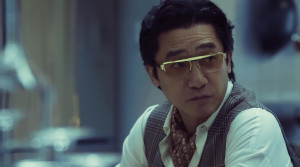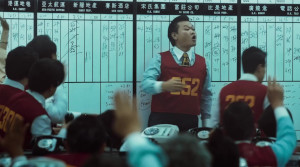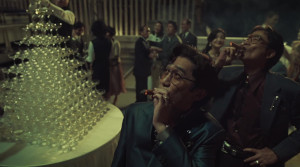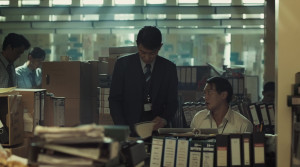

Jin shouzhi
Hong Kong 2023
Genre:
Crime, Thriller
Director:
Felix Chong
Cast:
Tony Leung
Andy Lau
Charlene Choi
Michael Ning
Simon Yam
Carlos Chan
Alex Fong
Philip Keung
Tai Bo

The Goldfinger

Story: It's the year 1972 and Henry Ching (Tony Leung Chiu-Wai) comes to Hong Kong to build a new life as an engineer. However, he pretends to be a powerful real estate buyer for K.K. Zeng (Simon Yam) on a small assignment so that Zeng can sell his properties to an interested buyer at a slightly higher price. Ching is so successful at it that from then on Zeng takes him under his wing. Eleven years later, Ching is independent and has built a giant empire. He has a travel company, a film production company as well as various real estates. His secretary Carmen (Charlene Choi) actively supports him in his work, and thanks to her he can finally win over his rival's stock market expert Ron Chong (Michael Ning). With his help, he is able to manipulate his company's stock market price and accumulates a huge fortune on the stock market. More and more banks are willing to lend him large sums of money, and so there seems to be no end to the bonanza for Ching. Unbeknownst to him, investigator Lau Kai-yuen (Andy Lau) of the ICAC, an authority dedicated to fighting corruption, is on his tail, though, since Ching gets more and more loans, not least because of various bribes. But soon Lau realizes that it is difficult to get close to Ching, as he already has too many allies...





Review: For a while now I've stopped expecting a masterpiece from Hong Kong like "Infernal Affairs" anymore, and after some disappointments in his filmography even the name Felix Chong, one of the two screenwriters and directors of the almost perfect crime thriller, doesn't fill me with enthusiasm anymore either (even if "Project Gutenberg" was quite well-done). Maybe that's why "The Goldfinger" surprised me in a positive way, or maybe I'm now more open to a story in which all you have to do is follow the money to see who's really in charge. Manipulation goes unpunished for those who have enough money and therefore have the law on their side. "The Goldfinger" is an ambitious movie that spans over several decades and uses the true story of the Carrian Group in Hong Kong as a hook for a thriller in which Tony Leung and Andy Lau finally meet again. This time, however, the roles they played in "Infernal Affairs" are reversed, and that alone sounds promising.

Felix Chong moves his story from the underworld to Hong Kong's high society, though. In this context, you need to praise the expensive sets. Still, the fact that everything glitters and sparkles more this time around doesn't change that, at the end of the day, Ching is the boss of a crime syndicate. Since the movie is mainly about fraud in stocks, there are some parallels to "The Wolf of Wall Street", not least because every now and then a few dancers burst into a meeting to celebrate the day, or because of an excessive party. Presumably, Chong also wanted to come full circle with this homage, because after all, Martin Scorsese's "The Departed" was a remake of Alan Mak and Felix Chong's masterpiece, and the screenplay even won an Oscar. So, in return, why shouldn't Chong also use some elements of Scorsese's "Wolf of Wall Street", although it must be noted that the insertions don't always work that well. The tone of "The Goldfinger" is too serious for that, and the sometimes even innovative interludes are not used consistently enough so that you could recognize a common theme here.

However, the 70s and 80s sets are fascinating and were realized with great effort. You can always tell by fashion and technology used what decade we are in, and this also gives the movie a very special style. Hong Kong itself also gets a trip through time thanks to some (mostly well-done) CGI. The historical context in which the story takes place is always captured appropriately, so that things always manage to reel you in. This brings us to the plot, which is focused on the financial world, but everything is always explained in enough detail so that you are not left behind puzzled. Some details may be lost to those who don't know anything about stock market, but that doesn't matter. It is a pity, though, that the investigative work mainly consists of interrogations and sometimes treads water. On the other hand, the plot itself is always moving forward. Since the movie contains no or hardly any action scenes, it is all the more important that the events are told in a gripping way, and it is well done here.

Nevertheless, it's necessary that the events manage to be captivating, because unfortunately, the characters don't give us much to work with. In that regard, Tony Leung is allowed to show off most. His character is pretty charismatic, even though sometimes quite subtly so, but the fact that he mercilessly pursues his goals is revealed very quickly. Andy Lau, on the other hand, comes across more like a flat character. This is also due to the fact that he just gets a few scenes with his wife concerning his private life, but they only show how little his character is fleshed out. Only in the few scenes in which Leung and Lau are on screen together does a certain chemistry come to light, even though you would have hoped for a little bit more. When it comes to the supporting characters, however, things actually even look a bit worse. Charlene Choi ("Detective vs. Sleuths") could have been a complex character, as she is Ching's secretary and potential love interest, but gets "sold" by him. Ultimately, their storyline fizzles out. And things are even worse with the other supporting characters, especially Simon Yam's.





Another strange thing about the story is that the connections to Southeast Asia, which get obvious quite quickly, are not picked up again until the finale. This gives the impression that the director wanted to break down a complex story in order to focus on just Ching and the investigator, but that way he made the plot too confusing. Moreover, the movie doesn't work as a character study at all, if that's what he was trying to do (sometimes it seems that way), and that's a shame, because with Tony Leung and Andy Lau there would have been the potential to get a lot more out of the story. Nonetheless, the images and direction are outstanding, only some songs of the soundtrack feel out of place as they turn out too modern and therefore pull you out of the otherwise well-realized trip to the 70s and 80s. Overall, "The Goldfinger" could have been a bit more polished in terms of plot and especially in terms of characters. Despite all that, if you can warm up a little bit to the topic of finance, you will be pleasantly surprised by this somewhat different gangster flick.

Disclaimer










